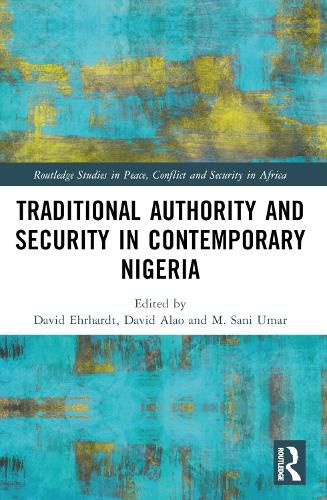Readings Newsletter
Become a Readings Member to make your shopping experience even easier.
Sign in or sign up for free!
You’re not far away from qualifying for FREE standard shipping within Australia
You’ve qualified for FREE standard shipping within Australia
The cart is loading…






Exploring the contentious landscape of Nigeria's escalating violence, this book describes the changing roles of traditional authorities in combatting contemporary security challenges.
Set against a backdrop of widespread security threats - including insurgency, land disputes, communal violence, regional independence movements, and widespread criminal activities - perhaps more than ever before, Nigeria's conventional security infrastructure seems ill-equipped for the job. This book offers a fresh, empirical analysis of the roles of traditional authorities - including kings, Ezes, Obas, and Emirs - who are often hailed as potent alternatives to the state in security governance. It complicates the assumption that these traditional leaders, by virtue of their customary legitimacy and popular roots, are singularly effective in preventing and managing violence. Instead, in exploring their creative adaptation to governance roles after a dramatic postcolonial downturn, this book argues that traditional leaders can augment, but not substitute, the state in addressing insecurity.
This book's in-depth analysis will be of interest to researchers and policy makers across African and security studies, political science, anthropology, and development.
The Open Access version of this book, available at http://www.taylorfrancis.com, has been made available under a Creative Commons Attribution-Non Commercial-No Derivatives (CC-BY-NC-ND) 4.0 license.
$9.00 standard shipping within Australia
FREE standard shipping within Australia for orders over $100.00
Express & International shipping calculated at checkout
Exploring the contentious landscape of Nigeria's escalating violence, this book describes the changing roles of traditional authorities in combatting contemporary security challenges.
Set against a backdrop of widespread security threats - including insurgency, land disputes, communal violence, regional independence movements, and widespread criminal activities - perhaps more than ever before, Nigeria's conventional security infrastructure seems ill-equipped for the job. This book offers a fresh, empirical analysis of the roles of traditional authorities - including kings, Ezes, Obas, and Emirs - who are often hailed as potent alternatives to the state in security governance. It complicates the assumption that these traditional leaders, by virtue of their customary legitimacy and popular roots, are singularly effective in preventing and managing violence. Instead, in exploring their creative adaptation to governance roles after a dramatic postcolonial downturn, this book argues that traditional leaders can augment, but not substitute, the state in addressing insecurity.
This book's in-depth analysis will be of interest to researchers and policy makers across African and security studies, political science, anthropology, and development.
The Open Access version of this book, available at http://www.taylorfrancis.com, has been made available under a Creative Commons Attribution-Non Commercial-No Derivatives (CC-BY-NC-ND) 4.0 license.